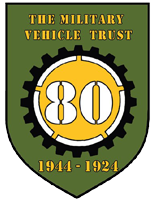Taking your Military Vehicle Abroad
|
Many of our members travel with their vehicles to foreign countries to visit landmarks and events.
Many travel to commemorations in Normandy, Holland or Belgium on the anniversaries of significant events, while others visit sites at different times of the year. Ferries and the Euro tunnel offer a wide range of crossing the English Channel or North Sea to get to the continent. You can either take your vehicle under its own steam or use a trailer to tow your vehicle. For owners who live further away from the ports, trailering saves time. |
Some countries place restrictions on longer, heavier or armoured vehicles – certificates might be required to get through customs. Vehicles with any armour plate, guns or holders for guns now require a permit. The MVT work in partnership with an agent who can support members to acquire the correct documentation. We strongly recommend that firearms are not taken abroad. Please contact us for more information.
Fuel availability – particularly for E10 and E5 petrol – can vary – we advise members to use one of the many phone apps available to help locate fuel of the right kind. |
OGELs (export licenses for historic vehicles visiting overseas)
In the past, there has been a great deal of confusion about whether export licenses are required when taking ex-military vehicles abroad to attend commemorative visits or for leisure purposes. The MVT have now received definitive guidance from our contact in the Export Control Joint Unit of the Department for Business & Trade.
The legislation called Open General Export Licence (historic military vehicles and artillery pieces) or OGEL covers historic military vehicles that are being temporarily exported for the purposes of historic-re-enactment, historic commemorative event, private battlefield tour or private recreational purposes.
Condition 4 (Registration) States: The requirements of Article 28 of the Order shall not apply to any export under this licence.
The legislation called Open General Export Licence (historic military vehicles and artillery pieces) or OGEL covers historic military vehicles that are being temporarily exported for the purposes of historic-re-enactment, historic commemorative event, private battlefield tour or private recreational purposes.
Condition 4 (Registration) States: The requirements of Article 28 of the Order shall not apply to any export under this licence.
|
Members simply need to print off and carry the OGEL document (the 2019 document accessed by the link
Open General Export Licence (historic military vehicles and artillery pieces) or use the pdf link below and have it ready to show customs if they are requested to do so. |
| ||||||
Armoured Vehicles
Please note that for armoured vehicles, there are separate regulations and they will require certification.
Members are advised to read the licence carefully to ensure it meets their requirements. OGELs are licences with set terms and conditions which you must comply with. If you cannot meet all conditions, you will need to apply for a Standard Individual Export Licence (SIEL) via SPIRE.
Please note that for armoured vehicles, there are separate regulations and they will require certification.
Members are advised to read the licence carefully to ensure it meets their requirements. OGELs are licences with set terms and conditions which you must comply with. If you cannot meet all conditions, you will need to apply for a Standard Individual Export Licence (SIEL) via SPIRE.
There is a considerable variation in driving and highways rules and regulations between different countries – even between the countries within the EU. Many have strict regulations about what paperwork and equipment must be carried - if you choose to take a trailer remember you may need separate documentation for that. Make sure that you are aware of which ones will apply to you.
|
Good sources of information include:
The RAC Government advice for the EU Country to Country Rules – The AA |
In addition to toll roads, Some European Cities have introduced very strict low emission zones For extra charges on the roads click here – For France |
|
If you are planning to go to Normandy for the 80th Anniversary Commemorations in June 2024, the MVT have created #MVTDDAY24, a community to support members making the trip. Registration costs just £35 and provides the following benefits.
When you sign up to #MVTDDAY24 you will receive the following benefits:
|


